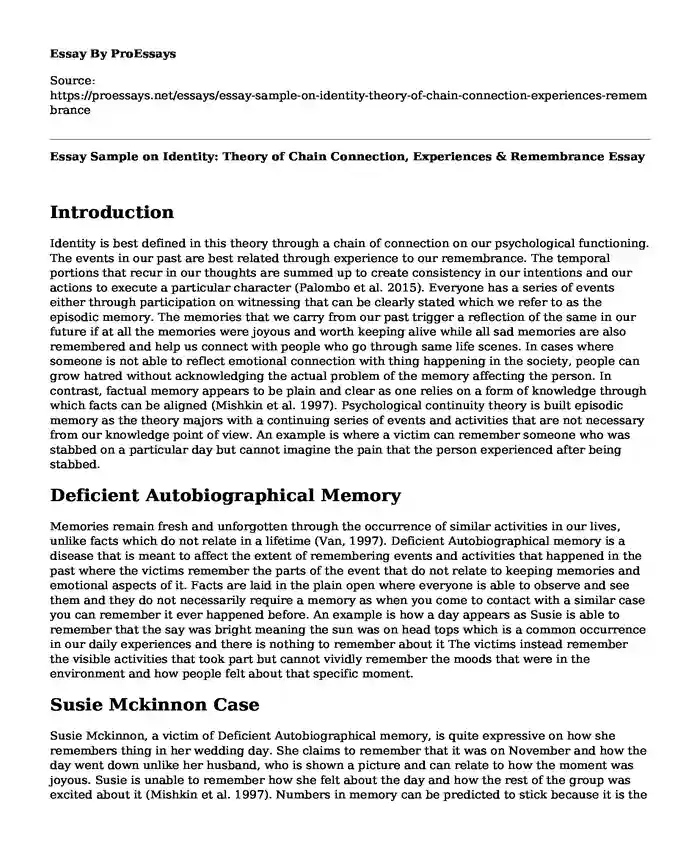Introduction
Identity is best defined in this theory through a chain of connection on our psychological functioning. The events in our past are best related through experience to our remembrance. The temporal portions that recur in our thoughts are summed up to create consistency in our intentions and our actions to execute a particular character (Palombo et al. 2015). Everyone has a series of events either through participation on witnessing that can be clearly stated which we refer to as the episodic memory. The memories that we carry from our past trigger a reflection of the same in our future if at all the memories were joyous and worth keeping alive while all sad memories are also remembered and help us connect with people who go through same life scenes. In cases where someone is not able to reflect emotional connection with thing happening in the society, people can grow hatred without acknowledging the actual problem of the memory affecting the person. In contrast, factual memory appears to be plain and clear as one relies on a form of knowledge through which facts can be aligned (Mishkin et al. 1997). Psychological continuity theory is built episodic memory as the theory majors with a continuing series of events and activities that are not necessary from our knowledge point of view. An example is where a victim can remember someone who was stabbed on a particular day but cannot imagine the pain that the person experienced after being stabbed.
Deficient Autobiographical Memory
Memories remain fresh and unforgotten through the occurrence of similar activities in our lives, unlike facts which do not relate in a lifetime (Van, 1997). Deficient Autobiographical memory is a disease that is meant to affect the extent of remembering events and activities that happened in the past where the victims remember the parts of the event that do not relate to keeping memories and emotional aspects of it. Facts are laid in the plain open where everyone is able to observe and see them and they do not necessarily require a memory as when you come to contact with a similar case you can remember it ever happened before. An example is how a day appears as Susie is able to remember that the say was bright meaning the sun was on head tops which is a common occurrence in our daily experiences and there is nothing to remember about it The victims instead remember the visible activities that took part but cannot vividly remember the moods that were in the environment and how people felt about that specific moment.
Susie Mckinnon Case
Susie Mckinnon, a victim of Deficient Autobiographical memory, is quite expressive on how she remembers thing in her wedding day. She claims to remember that it was on November and how the day went down unlike her husband, who is shown a picture and can relate to how the moment was joyous. Susie is unable to remember how she felt about the day and how the rest of the group was excited about it (Mishkin et al. 1997). Numbers in memory can be predicted to stick because it is the factual aspect of the mind that does not necessarily need to be revived but rather similar figures are most likely to appear on daily basis from time to time hence doesn’t affect the memory aspect of it. Deficient Autobiographical memory is a disease like any other that should equally be treated with the necessary attention it deserves and accepting its victims among us with the minor disability that they may portray.
References
Mishkin, M., Suzuki, W. A., Gadian, D. G., & Vargha–Khadem, F. (1997). Hierarchical organization of cognitive memory. Philosophical Transactions of the Royal Society of London. Series B: Biological Sciences, 352(1360), 1461-1467.
Palombo, D. J., Alain, C., Söderlund, H., Khuu, W., & Levine, B. (2015). Severely deficient autobiographical memory (SDAM) in healthy adults: A new mnemonic syndrome. Neuropsychologia, 72, 105-118.
Van Inwagen, P. (1997). Materialism and the psychological-continuity account of personal identity. Philosophical Perspectives, 11, 305-319.
Cite this page
Essay Sample on Identity: Theory of Chain Connection, Experiences & Remembrance. (2023, Sep 17). Retrieved from https://proessays.net/essays/essay-sample-on-identity-theory-of-chain-connection-experiences-remembrance
If you are the original author of this essay and no longer wish to have it published on the ProEssays website, please click below to request its removal:
- Questions and Answers on Ethics, Charity, Animal Rights
- Essay on Family Stress
- State of Consciousness Essay Example
- Movement to Reduce Mental Health Stigma - Essay Sample
- Essay Sample on Safeguarding Tendencies: Adler's Neurotic Lifestyle
- Essay Example on Mental Health: Complex, Universal and Prevalent
- Essay Example on Motor Learning: Information Processing Critical for Success







